Scientific and technical information tools
CNRS researchers at CNRS Humanities & Social Sciences produce an average of 6,500 publications each year, two-thirds of which consist of scientific journal articles and book chapters. They can access more than 8,000 journals and around fifty platforms and databases via the BIB-CNRS portal funded by the CNRS.
Scientific and technical information tools
CNRS Humanities & Social Sciences has created different tools to promote and disseminate scientific research results including publications and research data:
- the RIBAC observatory which analyzes, characterizes and quantifies the scientific activities and production of all research actors;
- VariSHS, a platform which promotes and disseminates the work of HSS researchers;
- JournalBase, a bilingual open access platform on which users can run searches in humanities and social science journals and compare their referencing in different national and international sources and databases;
- a support policy for French scientific journals in the humanities and social sciences which aims to help professionalize practices and promote better dissemination and greater visibility;
- a charter on how to write affiliations in researchers' publications;
- a network of STI correspondents in CNRS Humanities & Social Sciences units which promotes the sharing and dissemination of practices, tools and experiences and acts as an intermediary between the Institute and its units;
- a training policy for all CNRS Humanities & Social Sciences stakeholders (Thematic schools, ANF)
- support for around twenty professional networks linked to the CNRS.
CNRS Humanities & Social Sciences has been actively supporting open access to research publications and data for around ten years through the national HAL platform and the OpenEdition infrastructure.
These tools and projects were developed in coordination with the major players in the field of scientific and technical information at national - with Research Infrastructures (IRs/IRs*) - and European levels.
Analysis of scientific production
Like the other sciences, the humanities and social sciences need to possess numerical indicators to complement the peer review of scientific production but specific features also have to be taken into account in our fields. These include a greater diversity of publication media (journal articles but also a significant proportion of book chapters), maintaining multilingualism, the presence of small research communities working on highly specialized subjects (e.g. endangered languages) and the absence of reference databases for bibliometric studies.
In this context,CNRS Humanities & Social Sciences's Scientific Council and management have developed a database called RIBAC which makes it possible to identify and describe the activity of research players in the humanities and social sciences in a standardized manner.
Publications
Les chercheurs CNRS permanents en sciences humaines et sociales ont produit annuellement environ 6500 publications en 2011, 2012, 2013, 2014, 2015, 2016, 2017, 2018. Les articles de revue et les chapitres d'ouvrage représentent près de 2/3 de la production totale.
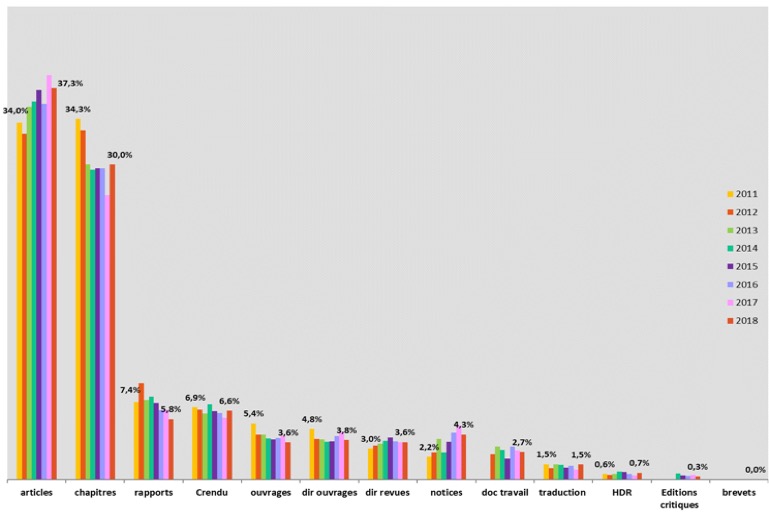
La répartition des types de publication est différente selon les champs disciplinaires.
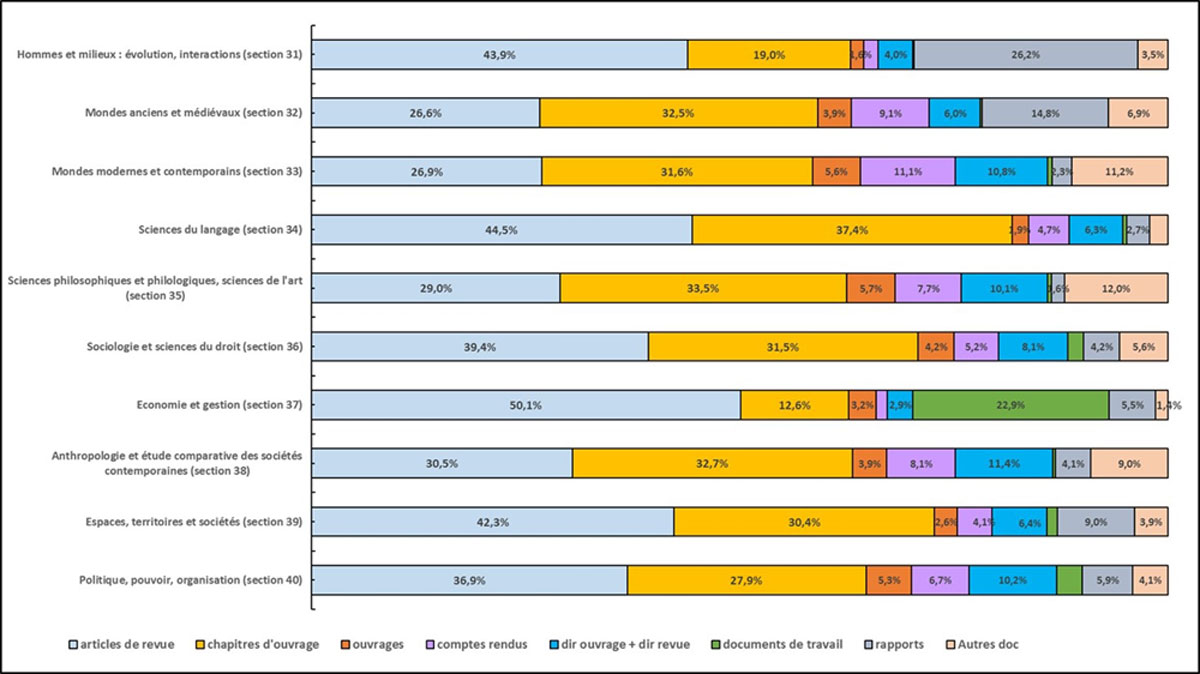
En « économie et gestion », presque ¾ de la production correspondent à des articles de revue et des documents de travail. Plus des 2/3 des productions dans le domaine « Hommes et milieux : évolution, interactions » se font sous forme d'articles de revues et de rapports. Les linguistes (section 34), sociologues et politologues (sections 36 et 40) et géographes (section 39) produisent également davantage d'articles dans des revues que de chapitres d'ouvrage.
A contrario, il y a une prédominance en faveur des chapitres d'ouvrage dans la production des anthropologues (section 38), des chercheurs et ingénieurs des domaines des «Sciences philosophiques et philologiques, sciences de l'art» (section 35) et des historiens des mondes anciens (section 32) et modernes et contemporains (section 33).
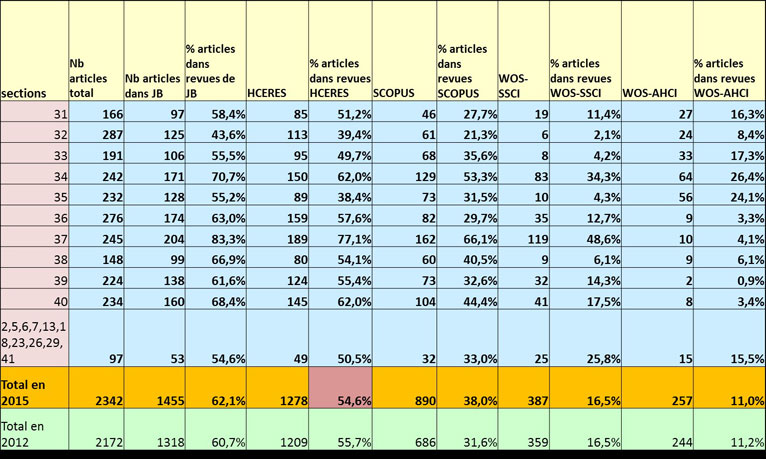
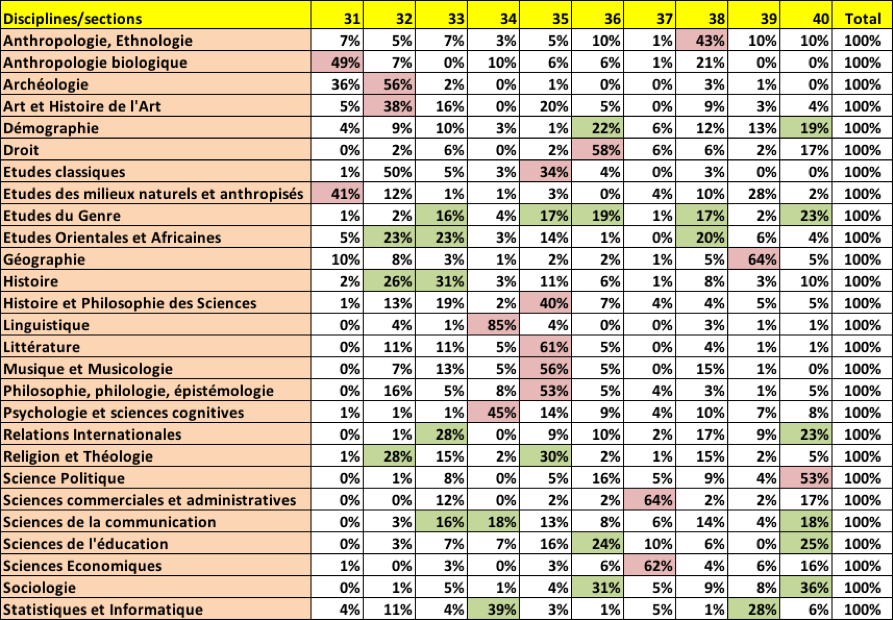
Participation à des colloques des chercheurs CNRS de CNRS Sciences humaines & sociales
L’activité « colloque » (communication et/ou organisation) est effectuée par 90,5 % des chercheurs et il n’y a pas de différences très importantes entre les disciplines (source Ribac 2012).
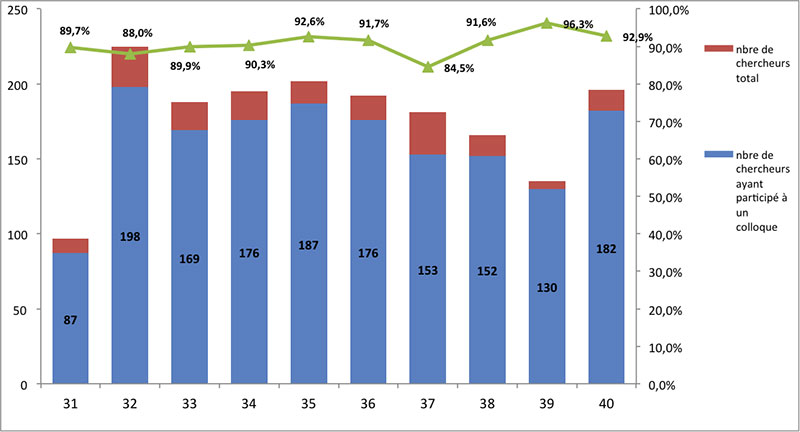
Presque 2/3 des colloques auxquels ont participé les chercheurs ont une audience internationale.
La presque totalité des présentations (95,7 %) se font sous la forme d’une communication orale. Les présentations sous forme de poster restent relativement peu nombreuses en SHS (source Ribac 2012).
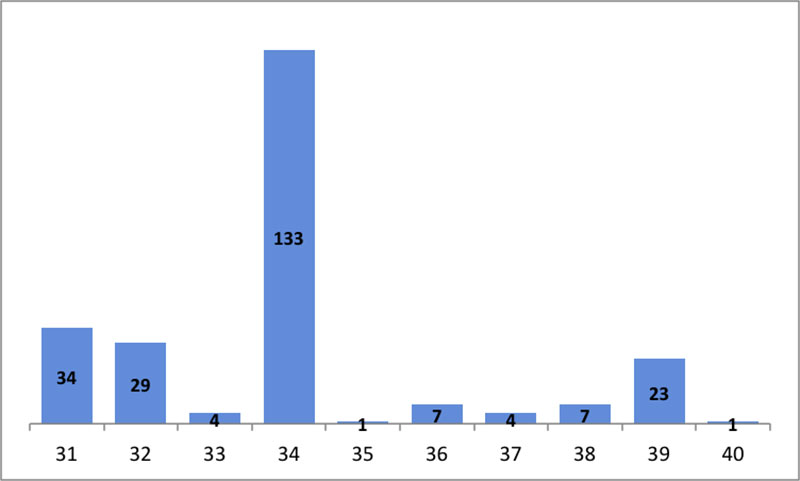
La participation et le portage des projets et programmes de recherche financés sur contrats des chercheurs CNRS de CNRS Sciences humaines & sociales
Environ 2/3 des chercheurs (64 %) ont déclaré être membres ou porteurs d’un programme de recherche. La répartition par section fait apparaitre une grande diversité de pratique d’une discipline à l’autre.
| sections | Nbre de chercheurs membres ou responsables de programmes | Nbre de chercheurs total RIBAC 2012 | % |
| 31 - Hommes et milieux : évolution, interactions | 80 | 97 | 82,5% |
| 32 - Mondes anciens et médiévaux | 160 | 225 | 71,1% |
| 33 - Mondes modernes et contemporains | 113 | 188 | 60,1% |
| 34 - Sciences du langage | 137 | 195 | 70,3% |
| 35 - Sciences philosophiques et philologiques, sciences de l'art | 113 | 202 | 55,9% |
| 36 - Sociologie et sciences du droit | 117 | 192 | 60,9% |
| 37 - Economie et gestion | 86 | 181 | 47,5% |
| 38 - Anthropologie et étude comparative des sociétés contemporaines | 91 | 166 | 54,8% |
| 39 - Espaces, territoires et sociétés | 109 | 135 | 80,7% |
| 40 - Politique, pouvoir, organisation | 135 | 196 | 68,9% |
| autres sections | 13 | 21 | 61,9% |
| Total | 1154 | 1798 | 64,2% |
Nombre de chercheurs CNRS de l'institut membres ou porteurs de projets en fonction de la typologie des projets
| typologie des projets | nombre de responsables | nombre de membres |
| ANR | 182 | 537 |
| Divers national | 81 | 335 |
| Ministère | 58 | 143 |
| Europe | 54 | 202 |
| CNRS | 51 | 112 |
| Investissement d'avenir | 46 | 131 |
| Région | 44 | 89 |
| Divers international | 27 | 333 |
| Fondation | 24 | 31 |
| Université | 16 | 44 |
| Laboratoire | 12 | 97 |
| MSH | 11 | 25 |
| Mission archéologique | 9 | 59 |
| Privé | 1 | 58 |
| Total | 616 | 2196 |